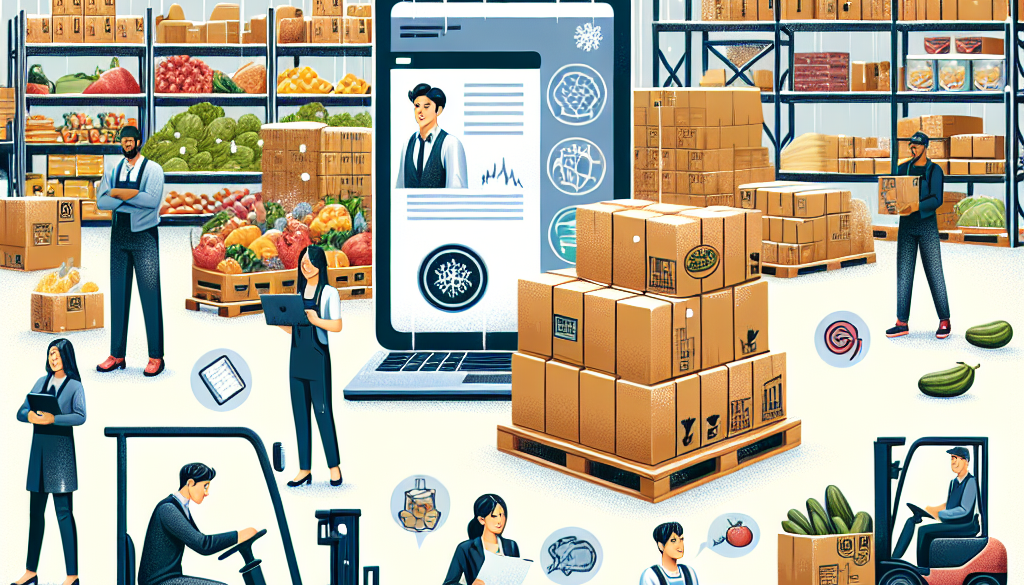What Are the Major Challenges Faced by Wholesale Food Distributors?
-
Table of Contents
- Challenges Facing Wholesale Food Distributors Today
- 1. Fluctuating Food Prices and Market Volatility
- 2. Supply Chain Disruptions
- 3. Regulatory Compliance and Food Safety
- 4. Technological Advancements and Integration
- 5. Consumer Demand for Transparency and Sustainability
- 6. Competition and Market Consolidation
- 7. Labor Shortages and Workforce Management
- 8. Energy Costs and Environmental Concerns
- 9. Managing Customer Relationships and Expectations
- 10. Adapting to E-commerce and Direct-to-Consumer Trends
- Conclusion
- ETprotein: Your Partner in Quality Protein Products
Challenges Facing Wholesale Food Distributors Today

The wholesale food distribution industry is a critical component of the global food supply chain, ensuring that a wide variety of products reach retailers and, ultimately, consumers. However, this sector faces numerous challenges that can affect its efficiency and profitability. In this article, we will explore the major hurdles that wholesale food distributors must overcome to remain competitive in today’s market.
1. Fluctuating Food Prices and Market Volatility
One of the most significant challenges for wholesale food distributors is the volatility of food prices. Factors such as weather conditions, political instability, and global market trends can cause rapid fluctuations in the cost of goods. For instance, the FAO Food Price Index, which tracks monthly changes in international prices of commonly-traded food commodities, has shown considerable volatility over the years, impacting purchasing and pricing strategies for distributors.
2. Supply Chain Disruptions
Supply chain disruptions can occur due to various reasons, including natural disasters, transportation strikes, and geopolitical conflicts. The COVID-19 pandemic, for example, has highlighted the fragility of global supply chains, causing delays and shortages that have rippled through the food distribution industry.
3. Regulatory Compliance and Food Safety
Wholesale food distributors must navigate a complex web of regulations that vary by country and region. Ensuring compliance with food safety standards, such as the Food Safety Modernization Act (FSMA) in the United States, requires significant resources and constant vigilance. Non-compliance can lead to costly recalls and damage to a company’s reputation.
4. Technological Advancements and Integration
Keeping up with technological advancements is essential for efficiency and competitiveness. However, integrating new technologies into existing systems can be challenging and expensive. Distributors must invest in software for inventory management, logistics, and customer relationship management (CRM) to streamline operations and meet the demands of a tech-savvy marketplace.
5. Consumer Demand for Transparency and Sustainability
Modern consumers are increasingly interested in the origin and sustainability of their food. Distributors are under pressure to provide transparent information about their products and adopt more sustainable practices, which can involve revamping supply chains and sourcing strategies.
6. Competition and Market Consolidation
The food distribution industry is highly competitive, with constant pressure from both large multinational corporations and smaller, niche players. Market consolidation through mergers and acquisitions can also threaten the survival of independent wholesale distributors.
7. Labor Shortages and Workforce Management
Finding and retaining skilled workers is a persistent challenge in the food distribution industry. Labor shortages, particularly in warehousing and transportation, can lead to increased costs and operational inefficiencies.
8. Energy Costs and Environmental Concerns
Energy costs are a significant expense for food distributors, especially those requiring refrigerated transportation and storage. Additionally, there is growing pressure to reduce carbon footprints and embrace renewable energy sources, which can require substantial investment.
9. Managing Customer Relationships and Expectations
Building and maintaining strong relationships with both suppliers and retailers is crucial for success. Wholesale distributors must meet the high expectations of their customers for timely deliveries, product availability, and quality service.
10. Adapting to E-commerce and Direct-to-Consumer Trends
The rise of e-commerce and direct-to-consumer sales models has disrupted traditional distribution channels. Wholesalers must adapt by developing online platforms and rethinking their role in the supply chain.
Conclusion
Wholesale food distributors face a complex array of challenges that require agility, strategic planning, and investment in technology and infrastructure. From managing volatile markets and supply chain disruptions to meeting regulatory requirements and consumer demands for sustainability, these companies must continuously evolve to stay ahead. By addressing these challenges head-on, wholesale food distributors can ensure their place in the global food supply chain and continue to provide essential services to retailers and consumers alike.
ETprotein: Your Partner in Quality Protein Products
In light of the challenges faced by wholesale food distributors, partnering with reliable suppliers like ETprotein can provide a competitive edge. ETprotein offers a range of high-quality protein products that meet the growing demand for organic, non-GMO, and allergen-free options. Their commitment to sustainability and quality makes them an ideal partner for distributors looking to enhance their product offerings and meet the expectations of today’s conscious consumers.
About ETprotein:
ETprotein, a reputable protein and L-(+)-Ergothioneine (EGT) Chinese factory manufacturer and supplier, is renowned for producing, stocking, exporting, and delivering the highest quality organic bulk vegan proteins and L-(+)-Ergothioneine. They include Organic rice protein, clear rice protein, pea protein, clear pea protein, watermelon seed protein, pumpkin seed protein, sunflower seed protein, mung bean protein, peanut protein, and L-(+)-Ergothioneine EGT Pharmaceutical grade, L-(+)-Ergothioneine EGT food grade, L-(+)-Ergothioneine EGT cosmetic grade, L-(+)-Ergothioneine EGT reference grade and L-(+)-Ergothioneine EGT standard. Their offerings, characterized by a neutral taste, non-GMO, allergen-free attributes, with L-(+)-Ergothioneine purity over 98%, 99%, cater to a diverse range of industries. They serve nutraceutical, pharmaceutical, cosmeceutical, veterinary, as well as food and beverage finished product distributors, traders, and manufacturers across Europe, USA, Canada, Australia, Thailand, Japan, Korea, Brazil, and Chile, among others.
ETprotein specialization includes exporting and delivering tailor-made protein powder and finished nutritional supplements. Their extensive product range covers sectors like Food and Beverage, Sports Nutrition, Weight Management, Dietary Supplements, Health and Wellness Products, and Infant Formula, ensuring comprehensive solutions to meet all your protein needs.
As a trusted company by leading global food and beverage brands and Fortune 500 companies, ETprotein reinforces China’s reputation in the global arena. For more information or to sample their products, please contact them and email sales(at)ETprotein.com today.












